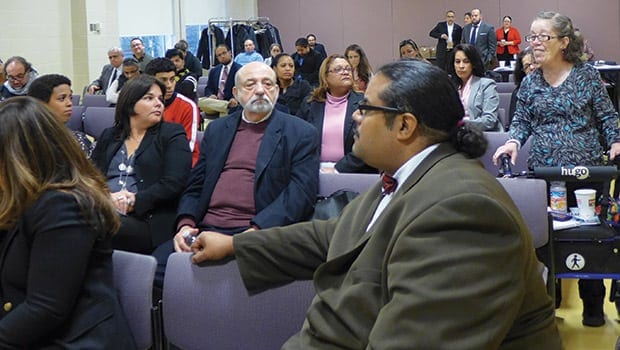
Puerto Rico was set up to fail and the federal government needs to take some responsibility, claim a group of activists seeking to mobilize constructive action.
That was a call made by Alliance for Puerto Rico Massachusetts, an organization of Puerto Rican labor and community leaders in the state, who convened a day-long presentation and discussion program at Roxbury Community College last week. The event, “Puerto Rico and Massachusetts: Current Crisis and a Vision for the Future,” focused on solutions to Puerto Rico’s current debt crisis and steps local Puerto Ricans can take.
One upcoming action: a Dec. 2 meeting with Congress. At the meeting, activists from Puerto Rican communities across the nation will urge Congress to pass reforms that could save the island from financial collapse, said Otoniel Figueroa-Duran, Alliance member and director of New England Service Employees International’s commercial division.
December deadlines
Deadlines loom over the fate of the island. Puerto Rico is supposed to pay back $354 million in principal and interest on Dec. 1 and its Government Development Bank is not sure that is possible.
The bank likely will run out of cash by the end of November, it announced in a financial filing. That means the government either has to cut services further— it already has closed some schools and halted payments to government suppliers — or default on its direct debt for the first time.
Hedge funds own most of the island’s debt. Many have pressed for such cuts to services to ensure they get the most repayment on their bonds.
Federal responsibility
Last month, the Obama administration offered a plan allowing Puerto Rico to restructure its debt. Currently, municipalities can declare bankruptcy, but not territories.
The proposed plans also would let residents to qualify for earned income tax credits — a tax refund for workers with low to moderate income — and provide Medicaid reimbursements at a level more equal to that in U.S. states. Forty-six percent of Puerto Ricans use Medicaid, but program coverage is very limited on the island. The reimbursement rate in Puerto Rico is 70 percent less than in any mainland state.
An independent oversight board would be created to oversee Puerto Rico’s finances.
For the plan to be enacted, Congress must approve it. Three bills aimed at improving Puerto Rico’s financial situation have been introduced to Congress in the past few months. All have stalled.
The federal government needs to acknowledge its role in creating an untenable economic system for Puerto Rico and an obligation to help save the island now that the system is falling apart, activists said.
“The U.S. government has a moral responsibility because of the colonial situation that hasn’t allowed us to go anywhere economically,” Figueroa-Duran said.
“The USA took 89 percent of resources since arriving [in Puerto Rico], “ said Jafet Robles, lead organizer with Neighbor to Neighbor, a minority, immigrant, women and working class activist group.
Wealth-extraction economy
Puerto Rico’s economy promotes a flow of wealth from the island, said Ian Seda-Irizarry, assistant professor of Economics at John Jay College.
Major tax exemptions for businesses and bondholders, as well as a flurry of corporate subsidies, lured outside companies to the island. Many came from the U.S. mainland. However, tax exemptions mean that few profits are shared with Puerto Rico’s government.
For example, Microsoft claimed that 47 percent of its sales revenue in the Western Hemisphere, or approximately $17.5 billion, came from its Puerto Rico-based operation, Seda-Irizarry said. If this money was reported as generated on the mainland, Microsoft would have to pay a 35 percent federal corporate tax rate. But in Puerto Rico, the corporate tax rate is 1 percent.
“This is legal tax evasion,” he said.
Other companies simply underreport their profits to reduce the amount of taxes they have to pay or do not submit income tax reports, he added.
“There is over $400 million in uncollected taxes,” Seda-Irizarry said, referring to 20,000 businesses that did not submit income tax reports in April 2014.
Such practices hamstring Puerto Rico’s ability to generate revenue to run its government. The economic model focuses on attracting businesses but secures little financial benefit from doing so.
“$35 billion leaves Puerto Rico [each year] and is not reinvested back in the island.”
He said Puerto Rico’s government shares some of the blame for clinging to the same failed economic system and continuing to issue subsidies over the past 11 years. Between 2006 and 2015, the government created 30 more laws relating to subsidies for foreign firms.
Further burdens on Puerto Rico include the Jones-Shafroth Act, which requires that any overseas transport of goods between two American locations be conducted by American ships and crews. The result for the territory: high import prices and more money funneled to American businesses.
Puerto Rico’s constitution also requires the government to prioritize paying off general-obligation bonds.
Structural flaws
Seda-Irizarry said the solution to the debt crisis cannot be simply throwing money at Puerto Rico. The economy needs major structural reforms.
“It’s like a flat tire. You can pump a lot of air into it but it’s not going to inflate. We have an economic model where there’s lots of leakages in terms of where does the money go.”
He promoted a shift to a co-op society, while an audience member recommended a focus on developing the nonprofit sector.
For others, all focus is on the next step: getting the federal government to act.
“We want Congress to acknowledge responsibility to help solve the problem they caused,” said Robles.






